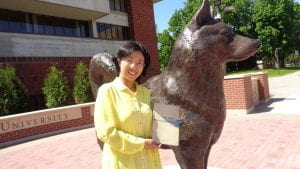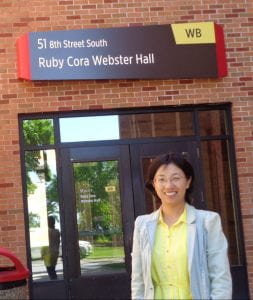This week, the SCSU English Department feels very fortunate to feature one of our past graduates, Ayan Omar.
Ms. Omar currently teaches Language Arts at St. Cloud Technical High School. Her students are very fortunate to be learning from such a tremendous leader.
“When I was a little girl, a black-Somali-Muslim refugee little girl, earning a master’s degree in English never seemed imaginable. Earning a master’s degree in English Studies at St. Cloud State solidified my ambitious refugee narrative and community efforts. Like many great writers, growing up, reading became my vehicle to success. Books buried my failures and inspired my successes. Gifted writers taught me how to express myself more eloquently. I fell in love with language as an art. Even today, amid the chaos and division of society, I maintain my faith in a better world by reading one book at a time. In my earlier years, Maya Angelou, in her book I Know Why The Caged Bird Sings, validated that all my experiences color the storyline of my life. Nathaniel Hawthorne, in his book The Scarlet Letter, branded my otherness as a pearl, despite what those in power might think. Lastly, the great writers, Whitman, Emerson, and Thoreau satiated my curiosity of transcendence. Their writings inspired me to practice intentional listening in search of a universal truth. Reading provided me a clear path to knowledge and pushed me toward civic engagement.
The English Studies graduate program at St. Cloud State fostered my personal growth. For instance, my thesis evaluated the goodness of black women using three of Toni Morrison’s greatest artifacts: The Bluest Eye, Beloved, and Sula. These three creative works expose the conflicting disposition and the unconscious bias held toward black women’s goodness by society. With the help of Dr. Monica Pelaez, I uncovered how Morrison writes progressively and pragmatically about black women and for black women. The continuous support, patience, hard questions, and immense knowledge of Dr. Pelaez allowed me to narrow down my topic, structure my thesis, and revise continuously. Her insightful comments allowed me to learn and produce throughout the entire experience.
I am forever grateful to Toni Morrison and the faculty at St. Cloud State’s English department, specifically Dr. Monica Pelaez, Dr. Constance Perry, Dr. Judith Dorn, and Dr. Christopher Lehman, for their insightful guidance.”
If that isn’t inspiring, then I don’t know what is. We have such an esteemed faculty in our English department, and Ms. Omar does a great job highlighting that fact. We are so proud, as a department, to have been a part of Ms. Omar’s life and we are excited to see where her journey takes her.
Are you interested in learning more about Ms. Omar?
Click here to read more about Ms. Omar and her journey!
Check out this video to hear her TED Talk!
Ms. Omar also had the opportunity to write a compelling article for the Washington Post where she discusses explaining her “faith to fearful Americans.”
If you’re still itching for more, please take the time to watch this video, a recording of “Face Value: Communication on a Human Scale,” a presentation she delivered at St. John’s University in 2019. Her story and
Last but not least, we highly encourage you to read her thesis, “What does it mean to be a good black woman?”, a study of the writings of Toni Morrison.




